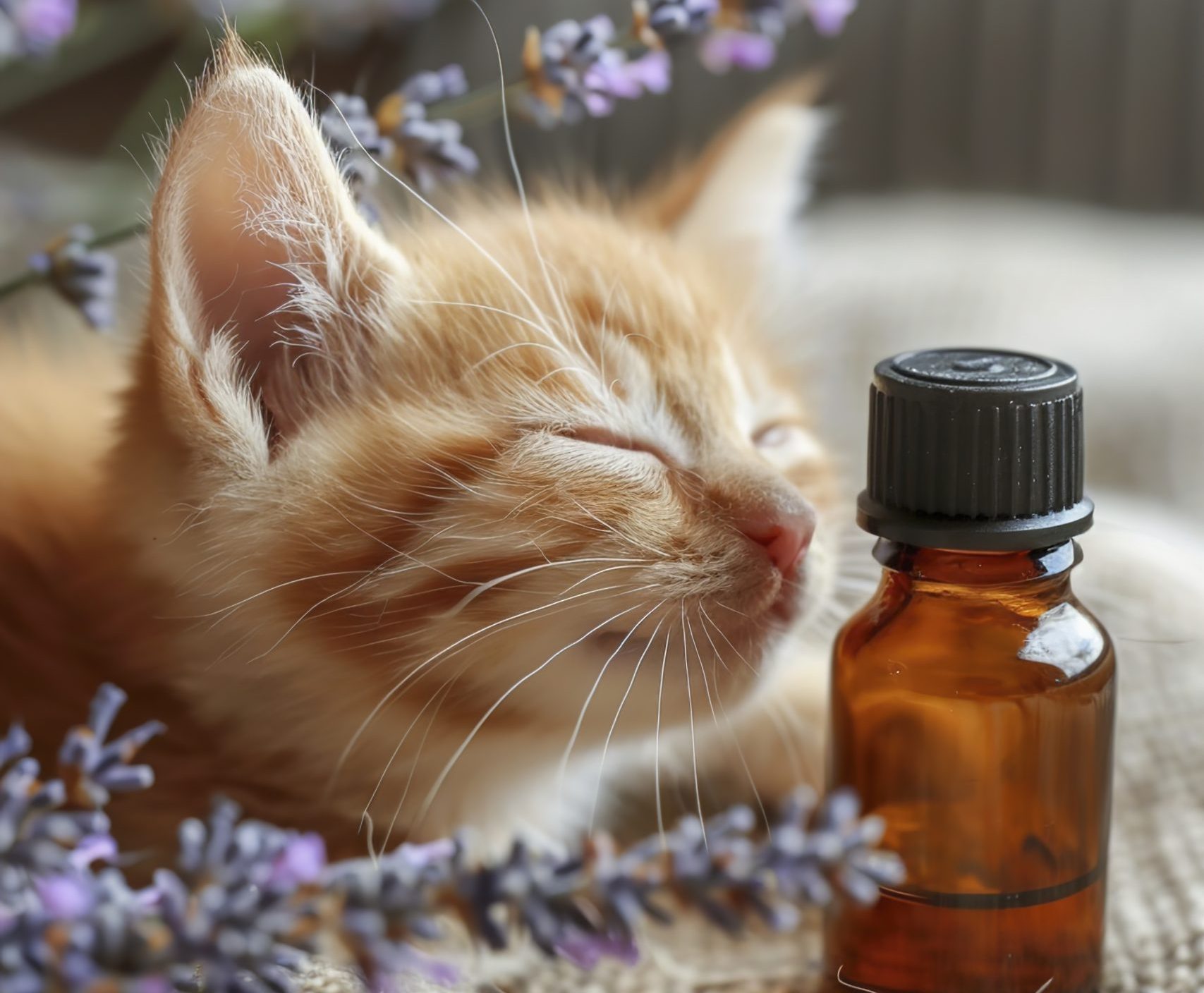Learn how to carefully use essential oils to treat and support minor health imbalances in your animals.
The right essential oils can complement your animals’ overall well-being. They help with pain relief, arthritis, anxiety, skin irritations, and more. Dr. Britta uses them in combination with other non-invasive holistic treatments to give animals the extra support they need. However, not all products are created equal, and not all essential oils or aromatherapy methods are safe. Cats, dogs, rodents, birds, and reptiles have unique physiologies that react differently to essential oils compared to human bodies. But with a few helpful guidelines, you can enjoy the benefits of aromatherapy safely with your animals!
Why Use Essential Oils in Animals?
Just like humans, animals can suffer from anxiety, pain, skin issues, digestive problems, and more. Conventional medicine can relieve symptoms, but if there are alternative treatments that have proven effective, you can spare your animal from unwanted side effects. Aromatherapy uses plant extracts that naturally interact with the body. Various essences trigger physical and emotional responses by stimulating the olfactory nerves. The limbic region of the brain processes these nerve signals, regulating functions like heart rate, hormone levels, mood, reflexes, and memory. With such a deep mind-body influence, aromatherapy can be an excellent complementary or alternative therapy.
Of course, incorrect use of essential oils can pose serious risks. Animals’ acute sense of smell detects compounds at magnitudes far beyond human capabilities. Remember: if a scent seems mild to you, it’s probably very strong for your pet. Without proper precautions, inhalation or ingestion of concentrated oils can cause respiratory issues, central nervous system depression, skin irritations, or internal organ damage. But with appropriate application methods and common sense, you can avoid these risks and safely enjoy the benefits.
Safety Guidelines for Essential Oils and Aromatherapy
General Safety Tips:
- Always consult Dr. Britta before using a specific brand or oil—she can guide you.
- Choose a high-quality, organic, eco-friendly brand.
- Check with your holistic vet before using essential oils, especially if your animal has a medical condition or is taking medications.
- Start slowly and with minimal exposure to see how your animal reacts.
- Always dilute oils before topical application.
- Keep oils away from eyes, ears, nose, genitals, and broken skin.
- Allow your pet to freely move away from diffuser vapors if they choose.
- Closely monitor initial reactions.
- Store oils out of reach to prevent accidental ingestion.
- Stop use if you notice any signs of discomfort or irritation.
Every animal can react differently to a specific oil. Observe behavioral changes during early exposure. If your pet pants, squints, rubs their face, shakes their head, or shows any unusual behavior, stop using the oil immediately. Allow their body to metabolize the oil until symptoms subside. What’s safe for one species may not be safe for another—so always proceed with caution.
Essential Oils Generally Safe for Dogs
When used correctly, the following oils are well tolerated by most dogs:
- Lavender: Soothes irritated skin and eases anxiety.
- Chamomile: Calms nervousness or hyperactivity.
- Peppermint: Freshens breath and relieves digestive issues.
- Cedarwood: Repels insects and calms anxiety.
- Frankincense: Supports the immune system and promotes healing.
- Copaiba: Eases pain, reduces inflammation, and helps joint discomfort.
Many quality brands produce oils specifically formulated for animals. These are often pre-diluted for safer topical use. Start with these formulas before trying human-grade oils.
Essential Oils Generally Safe for Cats
Cats require even more caution due to their size and sensitive physiology. However, they can still benefit from certain oils:
- Lavender: Reduces stress and soothes respiratory pathways.
- Frankincense: Regulates the nervous system, supports emotional balance, and aids in cancer support.
- Roman Chamomile: Eases stress and anxiety, and may help with urinary issues.
- Cedarwood: Reduces fear and shyness, and also repels fleas.
- Copaiba: Anti-inflammatory, useful for osteoarthritis or senior cats.
Always use blends formulated specifically for animals, as cats tolerate far fewer compounds than dogs.
Emergencies: Essential Oil Poisoning
Even with precautions, accidents can happen. If you notice any of these symptoms, seek veterinary attention immediately:
- Panting, wheezing, or breathing difficulties
- Drooling or trouble swallowing
- Nausea, vomiting, or diarrhea
- Lethargy, dizziness, or difficulty standing
- Tremors, seizures, or uncoordinated movement
- Red skin or chemical burns
Enjoy Aromatherapy Safely with Your Pet
Our animals deserve the same healing and wellness opportunities as humans. Aromatherapy can also benefit the rest of your family. When used responsibly, essential oils are a natural, gentle, and effective tool to help with minor health issues. Do thorough research on oils that are safe for your species, consult with Dr. Britta, and always watch for your pet’s reactions. Store oils properly and offer well-ventilated spaces. With the right knowledge, aromatherapy can become a beautiful way to care for your animal companions.

